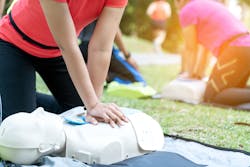Lower your stress, focus on emotional wellness, and make sure you know how to administer “hands-only CPR” as promoted by the American Heart Association (AHA). That’s the message cardiologists from Mount Sinai Heart are emphasizing during Heart Month in February to protect yourself and those around you.
Mount Sinai cardiologists say Black and Hispanic adults are less likely to receive CPR, especially in public places, and less likely to know how to perform CPR. In fact, these populations, already at higher risk of heart disease and other heart-related issues, are almost twice as likely to experience cardiac arrest as white adults and their survival rates are twice as poor when compared to white patients, according to the AHA. The organization is challenging all Americans to have at least one person in their immediate circle who knows the life-saving skill.
Mount Sinai cardiologists say they’re seeing more cases of stress and anxiety contributing to heart problems among patients. The number of people with high blood pressure, which poses an increased risk of heart attack and stroke, appears to be increasing since the pandemic. Stress can increase hormones such as adrenaline and cortisol, which negatively impact blood pressure and heart rate. Conversely, heart disease can also lead to anxiety, stress, and depression, creating a vicious cycle of worsening outcomes and less interest in preventive actions such as a healthy diet and appropriate levels of exercise. Physicians emphasize the need to focus on mental health and emotional wellness by taking the following steps:
- Pay attention—if you note a lack of desire to do things that you used to enjoy, seek help
- Engage in exercise and physical activity
- Eat fruits and vegetables; avoid fad diets and processed foods
- Hydrate appropriately with water and avoid sugary drinks
- Have a network of friends, family, or groups you can turn to, to talk and seek advice
Certain minority groups, including African Americans and Latinos/Latinas, are also at higher risk due to genetic predisposition, diet, lifestyle factors, and socioeconomic factors. However, illness in any population can be prevented by taking simple steps towards a healthier lifestyle.
Tips for lowering risk of heart disease:
- Know your family history
- Be aware of five key numbers cited by the American Heart Association: blood pressure, total cholesterol, HDL (or “good”) cholesterol, body mass index, and fasting glucose levels
- Maintain a healthy diet, eating nutrient-rich food and eliminating sweets
- Limit alcohol consumption to no more than one drink per day for women and men
- Quit using tobacco or other inhaled substances, including both smoking and electronic cigarettes/vapes
- Watch your weight and exercise regularly
- Learn the warning signs of heart attack and stroke, including chest discomfort; shortness of breath; pain in the arms, back, neck, or jaw; breaking out in a cold sweat; and lightheadedness

